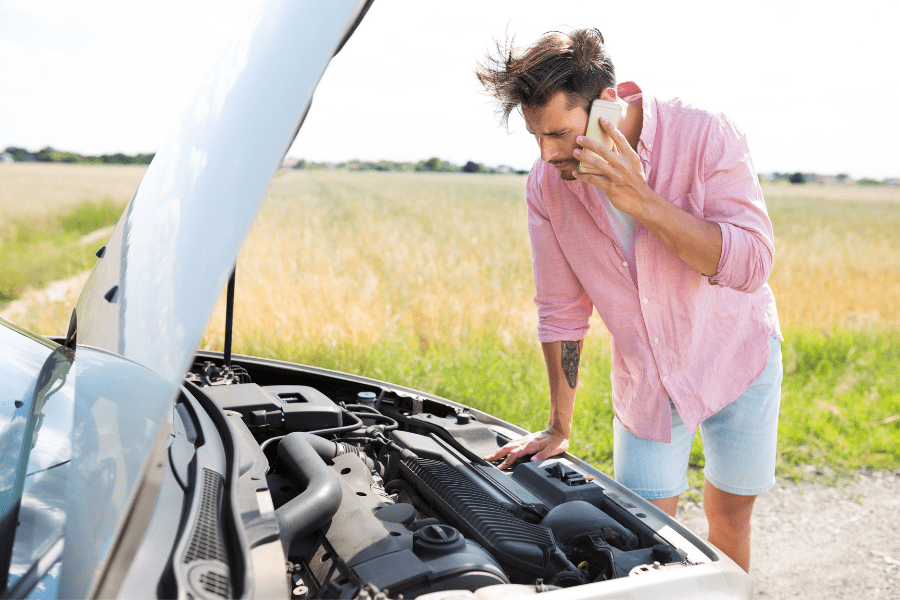Have you ever been caught off guard by a sudden car breakdown? Many drivers experience the frustration of common car problems, from faulty brakes to mysterious engine lights.
Understanding these issues and their potential solutions can save you time, money, and stress. In this article, we delve into the most common car problems drivers face and how your mechanic can effectively repair them and how you can try to avoid them in future. Whether it’s noisy brakes or an overheating engine, empowering yourself with knowledge about these issues can better prepare you to handle them when they arise.
Understanding Warning Signs
When it comes to common car problems, understanding the warning signs can be crucial in preventing major breakdowns. Paying attention to unusual sounds, smells, or dashboard warning lights can help you identify potential issues early on. For instance, a squeaking or grinding noise when you apply the brakes could indicate worn brake pads or discs. Ignoring such warning signs can lead to more extensive and costly repairs down the line. By staying attuned to your car’s behavior, you can proactively address any emerging problems before they escalate.
It is important to note, regular car maintenance plays a significant role in preventing common car problems. Adhering to the manufacturer’s recommended service schedule for tasks such as oil changes, tire rotations, and fluid checks can help keep your vehicle in optimal condition. Neglecting routine maintenance can lead to a host of issues, including engine overheating, transmission malfunctions, and premature wear and tear on vital components. By investing in regular maintenance, you can significantly reduce the likelihood of encountering common car problems and extend the lifespan of your vehicle.
Car Repairs Costs and Budgeting
Understanding the potential costs associated with common car problems can help you budget and plan for unforeseen repairs. For example, addressing a faulty catalytic converter or broken timing chain can incur significant expenses due to the complexity of the repairs and the cost of replacement parts. On the other hand, routine maintenance tasks such as oil changes, air filter replacements, and brake pad inspections are relatively affordable and contribute to the overall longevity of your vehicle. By being aware of the potential repair costs, you can make informed decisions about prioritising and addressing car issues as they arise.
Talk to your regular mechanic about the costs involved with regular servicing, along with more major repairs, so you can plan out your budget accordingly.
Most Common Car Problems and their Causes
While there’s a number of issues your car can face over its lifetime, some are more common than others.
Here’s a list of the most common car problems –
Car Battery – An essential component to your car, auto batteries can last from 2 – 5 years and will often show signs of problems with the car being sluggish to start, your lighting is dim or the car just won’t start at all. If you have problems with your alternator, this will usually place extra pressure on the battery. You can do this task yourself, but it is often recommended to get a professional.
Brakes – Signs of problems include a shuddering under the brakes, noise, smoke or smell coming from the brakes, and of course the brakes failing altogether. Brakes can fail due to age, wear, neglect, damaged discs and pads, overheating and loss of brake fluid. The front brake pads take approximately 70% of the braking which is why they typically need to be replaced more often.
Alternator – The Alternator ensures your battery is charged and powers the electrical system, and it can be affected by age, automotive system glitches and faulty wiring. Not only will your car come to a complete halt if there are issues, your other operating systems will be at risk.
Spark Plugs –Spark plugs ignite the fuel and air in a petrol engine, however if they are overdue for replacement, fuel consumption can increase and your car will not run as it usually does. Also best to be replaced by a professional, to avoid the need for a catalytic converter replacement. A good reminder to fix even the smallest parts of your car to avoid bigger, more expensive problems!
Fuel Injector – Most major automotive problems can usually be linked to the fuel injection system of your car. Most commonly your fuel injection system will become clogged, and will need to be cleaned out or replaced. This can be caused from frequently driving with under ¼ tank of fuel.
Air Conditioning- Car air conditioning is vital in Australia, not only through the hot summer months, but also for demystifying foggy windows. Most commonly your air conditioning can malfunction due to lack of refrigerant gas. This gas depletes over time, and results in reduced cooling performance or will stop working altogether.
Tyres – Worn out tyres can cause issues, whether they are underinflated, overinflated or there is excessive wear and tear. This can lead to the car tyre blowing out which can cause major road accidents. Generally they will need to be changed every 40,000 kilometres and it is usually advised to get a wheel balance, alignment or rotation to maximise tyre life.
Timing Chain/Belt – Over time, belts or chains can wear out and become loose or even break. As they are there to keep the crankshaft and camshafts perfectly timed, issues can cause parts of the engine to collide at high speed, and cause significant damage.
Steering – You will see quite a few signs if steering issues are on the way. If you can’t turn the steering wheel easily, or it slips through your fingers, then this is an urgent problem. Also if the car pulls to one side , the wheels shudder or you start hearing noises, then best to get checked out by a professional.
Starter Motor – There are two main components – the primary motor to start the engine, and solenoid to transmit electrical current from the battery. If there are issues with the engine not turning over, there is a grinding noise, the engine whining and not engaging, or smoke, it is best to call your mechanic.
DIY Car Problem Diagnosis and Repair Tips
While some car problems require professional expertise, there are certain issues that you can diagnose and address on your own. For example, if you notice that your car’s air conditioning system is blowing warm air, it could be due to a refrigerant leak or a faulty compressor. Conducting a visual inspection under the hood and checking the refrigerant levels can provide valuable insights into the issue. Additionally, simple tasks such as replacing a dead battery or a burnt-out headlight can be easily tackled with basic tools and a little know-how. By familiarising yourself with your vehicle’s basic components and functions, it’s possible for you to confidently handle minor repairs and maintenance tasks.
When to Seek Professional Help
There are instances where seeking professional help is essential. Complex issues such as the engine not turning over, smoke coming from your brakes or your steering wheel shuddering, require specialised knowledge and diagnostic equipment. Attempting to tackle these problems without the necessary expertise can exacerbate the issues and lead to costly repairs.
When in doubt, it’s best to entrust your car to a qualified mechanic who can accurately diagnose the problem and implement the appropriate repairs. Investing in professional expertise can ultimately save you time, money, and the frustration of unresolved car issues.
Preventing Future Problems with Regular Car Maintenance
In addition to reactive measures, taking proactive steps to prevent common car problems can significantly reduce the likelihood of unexpected breakdowns.
Regular Maintenance
One of the most effective ways to prevent common car problems is to adhere to a maintenance schedule and get your car serviced by a professional on a regular basis. This includes tasks like scheduled oil changes, fluid checks, filter replacements, and brake inspections. Regular maintenance not only helps identify potential issues early on but also ensures that your vehicle operates at peak performance and efficiency.
Addressing Warning Signs
It’s crucial for drivers to be attentive to any warning signs or changes in their vehicle’s behavior. Whether it’s unusual noises, dashboard warning lights, or changes in performance, addressing these warning signs promptly can prevent minor issues from escalating into costly car problems. Ignoring warning signs can lead to further damage and more extensive repairs, ultimately costing you more time and money.
Quality Fuel and Fluids
Using quality fuel and fluids, such as engine oil, transmission fluid, and coolant, can significantly impact the overall health and performance of your vehicle. High-quality fuel and fluids help maintain the integrity of engine components, reduce the risk of buildup and corrosion, and contribute to optimal vehicle performance. Additionally, adhering to the manufacturer’s recommendations for fuel and fluid specifications can prevent potential issues and ensure the longevity of your vehicle.
In addition, simple practices such as avoiding aggressive driving, maintaining proper tyre pressure, and keeping your vehicle clean can also contribute to its overall health and performance. Furthermore, storing your car in a sheltered environment and protecting it from extreme weather conditions can help preserve its exterior and interior components.
By incorporating preventive measures into your driving habits and maintenance routine, you can minimise the risk of encountering common car problems.
Choosing the Right Mechanic for Servicing or Repairs
When it comes to addressing car problems, the first crucial step is choosing the right mechanic. A skilled and trustworthy mechanic can make all the difference in the quality and cost of your car repairs.
Selecting the right mechanic is paramount in ensuring that your car problems are effectively diagnosed and repaired. Look for a certified mechanic with a proven track record of expertise in handling your specific vehicle make and model. Additionally, inquire about the warranty on repairs and the use of genuine replacement parts. It’s also beneficial to inquire about the mechanic’s approach to diagnostics. A competent mechanic should utilise advanced diagnostic tools and techniques to accurately identify car problems.
Furthermore, transparency and clear communication about the repair process, including an itemised breakdown of costs, are indicators of a professional and trustworthy mechanic. By selecting a reputable mechanic, you can be confident that your car problems will be accurately diagnosed and effectively repaired, ensuring your safety and the longevity and performance of your vehicle.
Additionally, seek out recommendations from friends, family, or online reviews to gauge the reputation and reliability of the mechanic. Building a long-term relationship with a reputable mechanic can offer peace of mind knowing that your car is in capable hands.
Conclusion
In conclusion, being well-informed about common car problems and their potential solutions empowers you to navigate the challenges of car ownership with confidence. Whether it’s staying attentive to warning signs, investing in regular maintenance, or seeking professional assistance when necessary, understanding the nuances of car repairs can save you from unnecessary stress and expenses.
By choosing the right mechanic and taking proactive steps to prevent issues, you can enjoy a smoother and more reliable driving experience. Remember, being proactive and knowledgeable about your vehicle can make all the difference in keeping your car running smoothly for years to come.
Tunemaster are here to help with all mechanical repairs and car servicing in North Brisbane, with the added advantage of being a mobile mechanic that comes to you!
Here are some of the Areas we Service – Redcliffe, North Lakes, Mango Hill, Kippa Ring, Clontarf, Margate, Kallangur, Narangba, Petrie, Morayfield, Burpengary, Deception Bay, Murrumba Downs, Lawnton, and Strathpine.
Call the friendly and experienced team at Tunemaster Mobile Automotive Services today on 0404 801823, or Contact Us through the website.

